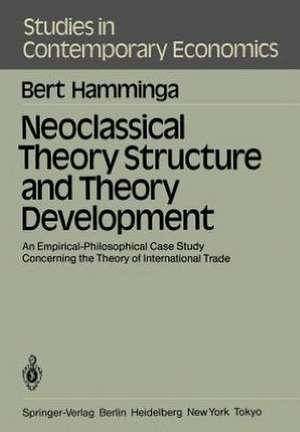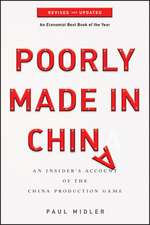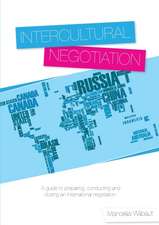Neoclassical Theory Structure and Theory Development: An Empirical-Philosophical Case Study Concerning the Theory of International Trade: Studies in Contemporary Economics, cartea 4
Autor B. Hammingaen Limba Engleză Paperback – aug 1983
Din seria Studies in Contemporary Economics
-
 Preț: 309.48 lei
Preț: 309.48 lei -
 Preț: 502.75 lei
Preț: 502.75 lei -
 Preț: 424.81 lei
Preț: 424.81 lei -
 Preț: 490.25 lei
Preț: 490.25 lei - 15%
 Preț: 637.78 lei
Preț: 637.78 lei -
 Preț: 421.72 lei
Preț: 421.72 lei -
 Preț: 501.41 lei
Preț: 501.41 lei -
 Preț: 485.46 lei
Preț: 485.46 lei - 15%
 Preț: 466.13 lei
Preț: 466.13 lei - 15%
 Preț: 647.08 lei
Preț: 647.08 lei - 15%
 Preț: 638.89 lei
Preț: 638.89 lei - 15%
 Preț: 638.89 lei
Preț: 638.89 lei -
 Preț: 490.25 lei
Preț: 490.25 lei -
 Preț: 488.12 lei
Preț: 488.12 lei -
 Preț: 485.24 lei
Preț: 485.24 lei - 15%
 Preț: 441.51 lei
Preț: 441.51 lei -
 Preț: 493.51 lei
Preț: 493.51 lei -
 Preț: 420.20 lei
Preț: 420.20 lei -
 Preț: 383.71 lei
Preț: 383.71 lei - 15%
 Preț: 635.80 lei
Preț: 635.80 lei - 15%
 Preț: 648.42 lei
Preț: 648.42 lei - 15%
 Preț: 644.82 lei
Preț: 644.82 lei -
 Preț: 487.37 lei
Preț: 487.37 lei -
 Preț: 451.26 lei
Preț: 451.26 lei - 15%
 Preț: 635.15 lei
Preț: 635.15 lei - 20%
 Preț: 557.75 lei
Preț: 557.75 lei - 15%
 Preț: 650.04 lei
Preț: 650.04 lei -
 Preț: 493.34 lei
Preț: 493.34 lei - 15%
 Preț: 634.18 lei
Preț: 634.18 lei -
 Preț: 486.60 lei
Preț: 486.60 lei -
 Preț: 495.46 lei
Preț: 495.46 lei -
 Preț: 485.46 lei
Preț: 485.46 lei -
 Preț: 481.58 lei
Preț: 481.58 lei -
 Preț: 485.61 lei
Preț: 485.61 lei -
 Preț: 418.67 lei
Preț: 418.67 lei -
 Preț: 417.90 lei
Preț: 417.90 lei -
 Preț: 492.74 lei
Preț: 492.74 lei -
 Preț: 488.33 lei
Preț: 488.33 lei -
 Preț: 419.21 lei
Preț: 419.21 lei -
 Preț: 483.12 lei
Preț: 483.12 lei -
 Preț: 486.60 lei
Preț: 486.60 lei -
 Preț: 425.42 lei
Preț: 425.42 lei - 15%
 Preț: 638.57 lei
Preț: 638.57 lei - 15%
 Preț: 637.28 lei
Preț: 637.28 lei -
 Preț: 483.70 lei
Preț: 483.70 lei -
 Preț: 414.21 lei
Preț: 414.21 lei -
 Preț: 428.84 lei
Preț: 428.84 lei - 15%
 Preț: 633.19 lei
Preț: 633.19 lei -
 Preț: 478.71 lei
Preț: 478.71 lei - 15%
 Preț: 639.41 lei
Preț: 639.41 lei
Preț: 636.45 lei
Preț vechi: 748.76 lei
-15% Nou
Puncte Express: 955
Preț estimativ în valută:
121.79€ • 125.64$ • 101.63£
121.79€ • 125.64$ • 101.63£
Carte tipărită la comandă
Livrare economică 26 martie-09 aprilie
Preluare comenzi: 021 569.72.76
Specificații
ISBN-13: 9783540128168
ISBN-10: 3540128166
Pagini: 188
Ilustrații: X, 176 p. 2 illus.
Dimensiuni: 170 x 244 x 10 mm
Greutate: 0.31 kg
Ediția:Softcover reprint of the original 1st ed. 1983
Editura: Springer Berlin, Heidelberg
Colecția Springer
Seria Studies in Contemporary Economics
Locul publicării:Berlin, Heidelberg, Germany
ISBN-10: 3540128166
Pagini: 188
Ilustrații: X, 176 p. 2 illus.
Dimensiuni: 170 x 244 x 10 mm
Greutate: 0.31 kg
Ediția:Softcover reprint of the original 1st ed. 1983
Editura: Springer Berlin, Heidelberg
Colecția Springer
Seria Studies in Contemporary Economics
Locul publicării:Berlin, Heidelberg, Germany
Public țintă
ResearchCuprins
1. Introduction for philosophers of science.- 2. On the cause of fruitless methodology (an introduction for economists).- 3. Aims and set-up of this study.- A. Two central theses in the theory of international trade and their place in the economists’ world view.- A.1. The neoclassical economists’ world view: neoclassical foundations of economic analysis.- A.2. The effects of international trade through the economists’ spectacles: comparative statics.- A.3. Two central theses in the theory of international trade.- A.4. Why are the theorems “interesting”.- B. The emergence of interesting theorems.- B.1. Introduction.- B.2. The Stolper-Samuelson Exposition.- B.3. Questions arising in connection with the S&S-exposition.- C. Economic “normal science” centred around interesting theorems.- C.1. Introduction.- C.2. Some central concepts in informal symbolism.- C.3. Examples of research centred around the S&S-theorem.- C.4. Research centred around the factor price equalization theorem.- C.5. Summary.- D. Consolidation: metatheory on theory structure and theory development in the Ohlin-Samuelson research programme.- E. The hypothesis of the plausibility strategy.- E.1. The “plausibility strategy”: a first approach.- E.2. Initial explanatory power of the hypothesis.- E.3. Elementary plausibility.- E.4. SEPC, the enigma.- F. Problems of econometrics. The mutal independency thesis.- F.1. Identification problems.- F.2. Anchoring problems.- F.3. How these problems arise from the nature of theory development in the Ohlin-Samuelson programme.- F.4. The mutual independency thesis.- G. Conclusion: results and relevance.- G.1. Summary of the metatheory.- G.2. Some concluding remarks on the relationship between theory development and plausibilism.- G.3. Some beliefs aboutthe generality of the metatheory.- G.4. The merits and problems of other metatheories if applied to neoclassical general equilibrium research programmes.- G.5. Vice, Virtue and Rationality.- H. Appendix: a scheme for formalization of the link between theory development and plausibilism.- I. Appendix: the irrefutability of the Samuelson-type meaningfull theorems.- J. Appendix: The Friedman controversy and its consensus.- K. Appendix: Ricardian versus neoclassical FEA.- L. References.- M. Index.












